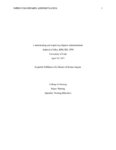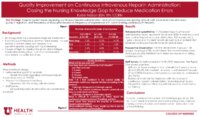The Graduate Nursing Project collection includes Doctor of Nursing Practice (DNP) Scholarly Projects and Master's students' non-thesis projects submitted as part of program requirements.
TO
1 - 25 of 5
| Title | Creator | Date | Description | Relation Is Part Of | ||
|---|---|---|---|---|---|---|
| 1 |
 |
Understanding and Improving Heparin Administration | LaValley, Sydnie | 2022 | At a 400-bed teaching hospital in the Mountain West, unfractionated heparin administration continues to be a source of medication errors despite attempts to mitigate the inherent risks and improve education for all healthcare providers involved. Other institutions have completed quality improvement ... | Graduate Nursing Project, Master of Science, MS, Nursing Education |
| 2 |
 |
Improve Adherence to the Nurse-Driven Continuous Intravenous Heparin Administration Protocol on a Neurocritical Care Unit | Castle, Bronwynne | 2022 | Background: Anticoagulation therapy is associated with high rates of dosing errors, and intravenous heparin therapy accounts for two-thirds of those errors. The therapeutic margins for heparin are narrow, and errors result in coagulation times that are too short or prolonged and can produce harmful ... | Graduate Nursing Project, Doctor of Nursing Practice, DNP, Primary Care FNP |
| 3 |
 |
Improving Compliance with the Intravenous Heparin Protocol on a Neurocritical Care Unit | Castle, Bronwynne | 2022 | POSTER | Graduate Nursing Project, Doctor of Nursing Practice, DNP, Primary Care FNP, Poster |
| 4 |
 |
Quality Improvement on Continuous Intravenous Heparin Administration: Closing the Nursing Knowledge Gap to Reduce Medication Errors; Nomograms | Nelson, Kylee | 2021 | Anticoagulants are considered a high-alert or a high-risk medication (D'Souza et al., 2019; Johnson et al., 2018; Kindelin et al., 2020; Oertel & Heparin Consensus Group, 2004). This is due to their narrow therapeutic index and the "ability to cause significant patient harm or death" ... | Graduate Nursing Project, Master of Science, MS, Nursing Education |
| 5 |
 |
Quality Improvement on Continuous Intravenous Heparin Administration: Closing the Nursing Knowledge Gap to Reduce Medication Errors | Nelson, Kylee | 2021 | POSTER | Graduate Nursing Project, Master of Science, MS, Nursing Education, Poster |
1 - 25 of 5
